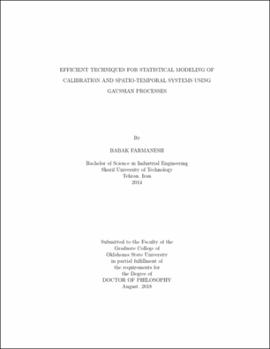| dc.contributor.advisor | Pourhabib, Arash | |
| dc.contributor.author | Farmanesh, Babak | |
| dc.date.accessioned | 2023-04-20T18:24:48Z | |
| dc.date.available | 2023-04-20T18:24:48Z | |
| dc.date.issued | 2018-08 | |
| dc.identifier.uri | https://hdl.handle.net/11244/337445 | |
| dc.description.abstract | Gaussian processes (GPs) are one of the most widely used tools in statistical modeling of various engineering systems. In this dissertation, we study three common types of problems in statistical modeling, i.e., prediction, calibration, and forecasting, using GPs and other related techniques.First, we study the problem of prediction using Gaussian Process Regression (GPR) in large-scale spatial systems that contain exogenous variables. We propose a Sparse Pseudo-input Local Gaussian Process (SPLGP) that addresses the inefficiencies of GPR, i.e., computational complexity and covariance heterogeneity, in dealing with spatial systems in a unifying framework. We propose new theorems that form the basis of our decomposition policy and develop an optimization procedure to find the optimal policy. We also impose continuity constraints on the boundaries of the subdomains to alleviate the problem of discontinuity of the global predictor. Next, we study the calibration problem for expensive computational models (ECM), i.e., computational models that cannot be evaluated a large number of times. We propose a Bayesian Non-isometric Matching Calibration (BNMC) approach that allows calibration of ECM. The proposed model uses GPs to embrace the restrictions of ECM and makes inferences on the calibration parameters through a Bayesian framework. We also present a geometric interpretation of calibration that enables us to take advantage of combinatorial optimization techniques to extract necessary information for constructing prior distributions of our Bayesian framework. Finally, we study the problem of forecasting in complex spatio-temporal systems with the primary focus on short-term wind speed forecasting in wind farms. We propose a similarity-based forecasting model capable of taking any type of spatial and temporal information into account to improve spatio-temporal forecasting, in particular wind speed forecasting. The proposed model is inspired by the weighted averaging technique used in a class of regression models known as non-parametric linear smoothers which includes GPR. We also equip our model with a variable selection and a parameter training procedure, so that it can be easily applied to any spatio-temporal system. We present a set of experimental results for each problem to demonstrate the efficiency of our proposed models comparing to other existing models. | |
| dc.format | application/pdf | |
| dc.language | en_US | |
| dc.rights | Copyright is held by the author who has granted the Oklahoma State University Library the non-exclusive right to share this material in its institutional repository. Contact Digital Library Services at lib-dls@okstate.edu or 405-744-9161 for the permission policy on the use, reproduction or distribution of this material. | |
| dc.title | Efficient techniques for statistical modeling of calibration and spatio-temporal systems using Gaussian processes | |
| dc.contributor.committeeMember | Balasundaram, Balabhaskar | |
| dc.contributor.committeeMember | Yousefian, Farzad | |
| dc.contributor.committeeMember | Sharda, Ramesh | |
| osu.filename | Farmanesh_okstate_0664D_15940.pdf | |
| osu.accesstype | Open Access | |
| dc.type.genre | Dissertation | |
| dc.type.material | Text | |
| dc.subject.keywords | calibration of computer models | |
| dc.subject.keywords | Gaussian processes | |
| dc.subject.keywords | spatial systems modeling | |
| dc.subject.keywords | spatio-temporal forecasting | |
| thesis.degree.discipline | Industrial Engineering and Management | |
| thesis.degree.grantor | Oklahoma State University | |
